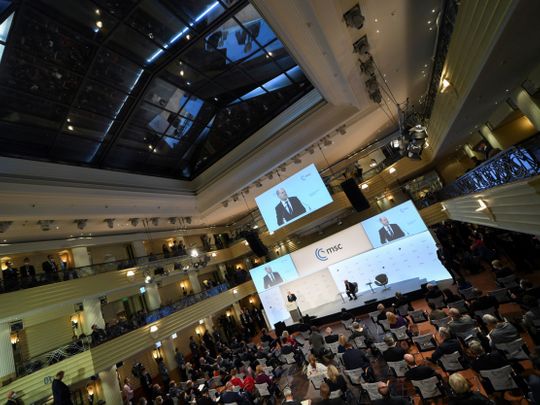
Munich: German Chancellor Olaf Scholz said on Saturday that “now is the moment of truth’’ to determine whether Iran’s 2015 nuclear deal with world powers can be salvaged, and the Iranian leadership needs to make a choice.
Negotiators from Iran and the remaining parties to the agreement — Britain, France, Germany, Russia and China — are working in Vienna to restore life to the accord, which granted Iran sanctions relief in exchange for curbs on its nuclear programme.
The United States has participated indirectly in the talks because it withdrew from the deal in 2018 under then-President Donald Trump. President Joe Biden has signalled that he wants to rejoin the deal.
Under Trump, the US reimposed heavy sanctions on Iran. Tehran has responded by increasing the purity and amounts of uranium it enriches and stockpiles, in breach of the accord — formally known as the Joint Comprehensive Plan of Action, or JCPOA.
Scholz told participants at the annual Munich Security Conference on Saturday that talks have come a long way over the past 10 months and “all elements for a conclusion of the negotiations are on the table.’’
But he also criticized Iran for stepping up its enrichment and restricting inspections by monitors from the U.N. nuclear agency.
“We now have the opportunity to reach an agreement that makes it possible for sanctions to be lifted,” Scholz said. “At the same time, it’s the case that if we don’t succeed very quickly in this, the negotiations threaten to fail.’’
“The Iranian leadership now has a choice,” the chancellor said. “Now is the moment of truth.’’
Iran ‘favours the quality of any possible deal’
Iran’s foreign minister, meanwhile, said Iran favours the “quality” of any possible deal, official Irna news agency reported Saturday.
Rejecting some comments of “setting fake deadlines,” Hossein Amir Abdollahian said in a meeting with his German Foreign Minister Annalena Baerbock that Iran believes the “quality” of an agreement should be assessed within the context of time.
“If the legitimate demands of Tehran are respected today, an agreement can be reached in Vienna,” Abdollahian added.
“In these last steps, it is important for the other party not to make miscalculations and not to drag the negotiations to the media space,” he noted.
The Iranian top diplomat, who is in Germany for the 58th Munich Security Conference, emphasized his country’s determination for “a good agreement,” expressing the hope that parties to the negotiations can play an effective role in securing Iran’s “legitimate rights.”
On Friday, Abdollahian said the talks between Iran and the world powers in Vienna are “very close to a good and accessible agreement.”












